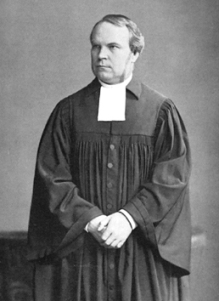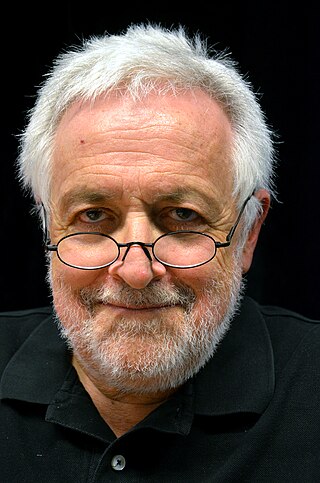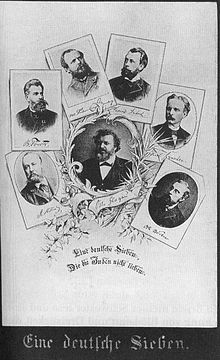
German Christians were a pressure group and a movement within the German Evangelical Church that existed between 1932 and 1945, aligned towards the antisemitic, racist and Führerprinzip ideological principles of Nazism with the goal to align German Protestantism as a whole towards those principles. Their advocacy of these principles led to a schism within 23 of the initially 28 regional church bodies (Landeskirchen) in Germany and the attendant foundation of the opposing Confessing Church in 1934. Theologians Karl Barth and Dietrich Bonhoeffer drafted the Barmen Declaration the same year opposing Nazi doctrines.

Paul Anton de Lagarde was a German biblical scholar and orientalist, sometimes regarded as one of the greatest orientalists of the 19th century. Lagarde's strong support of anti-Semitism, vocal opposition to Christianity, racial Darwinism and anti-Slavism are viewed as having been among the most influential in supporting the ideology of Nazism.

Adolf Stoecker was a German court chaplain to Kaiser Wilhelm I, a politician, leading antisemite, and a Lutheran theologian who founded the Christian Social Party to lure members away from the Social Democratic Workers' Party.

Eugen Richter was a German politician and journalist in Imperial Germany. He was one of the leading advocates of liberalism in the Prussian Landtag and the German Reichstag.

Henryk Marcin Broder, self-designation Henryk Modest Broder, is a Polish-born German journalist, author, and television personality.
The Christian Social Party was a right-wing political party in the German Empire founded in 1878 by Adolf Stoecker as the Christian Social Workers' Party.
Walter Frank, also known by the pseudonym Werner Fiedler was a Nazi historian, notable for his leading role in anti-Semitic research.
Since the 18th century Berlin has been an influential musical center in Germany and Europe. First as an important trading city in the Hanseatic League, then as the capital of the electorate of Brandenburg and the Prussian Kingdom, later on as one of the biggest cities in Germany it fostered an influential music culture that remains vital until today. Berlin can be regarded as the breeding ground for the powerful choir movement that played such an important role in the broad socialization of music in Germany during the 19th century.

The Institute for the Study and Elimination of Jewish Influence on German Church Life was a cross-church establishment by eleven German Protestant churches in Nazi Germany, founded at the instigation of the German Christian movement. It was set up in Eisenach under Siegfried Leffler and Walter Grundmann. Georg Bertram, professor of New Testament at the University of Giessen, who led the Institute from 1943 until the Institute's dissolution in May 1945, wrote about its goals in March 1944: "'This war is Jewry's war against Europe.' This sentence contains a truth which is again and again confirmed by the research of the Institute. This research work is not only adjusted to the frontal attack, but also to the strengthening of the inner front for attack and defence against all the covert Jewry and Jewish being, which has oozed into the Occidental Culture in the course of centuries, ... thus the Institute, in addition to the study and elimination of the Jewish influence, also has the positive task of understanding the own Christian German being and the organisation of a pious German life based on this knowledge."

Wolfgang Benz is a German historian from Ellwangen. He was the director of the Center for Research on Antisemitism of the Technische Universität Berlin between 1990 and 2011.
The Institute for Research on the Jewish Question was a Nazi Party political institution, founded in April 1939. Conceived as a branch of a projected elite university of the party under the direction of Alfred Rosenberg, it officially opened in Frankfurt am Main in March 1941, during the Second World War, and remained in existence until the end of the war, in 1945.

The Militant League for German Culture, was a nationalistic anti-Semitic political society during the Weimar Republic and the Nazi era. It was founded in 1928 as the Nationalsozialistische Gesellschaft für deutsche Kultur by Nazi ideologue Alfred Rosenberg and remained under his leadership until it was reorganized and renamed to the National Socialist Culture Community in 1934.

Lorenz Hubert Weinrich is a German historian.
Werner Bergmann is a German sociologist. He is Professor of Sociology at the Center for Research on Antisemitism at the Technical University of Berlin.
Mario Keßler is a German historian.
The "Jewish parasite" is a notion that dates back to the Age of Enlightenment. It is based on the idea that the Jews of the diaspora are incapable of forming their own states and would therefore parasitically attack and exploit states and peoples, which are biologically imagined as organisms or "peoples bodies". The stereotype is often associated with the accusation of usury and the separation of "creative", i.e. productive, and "raffling", non-productive financial capital.
Jüdische Rundschau was a Jewish periodical that was published in Germany between 1902 and 1938. It was the biggest Jewish weekly publication in Germany, and was the origin of the Zionist Federation of Germany.
Friedrich Lienhard was a German writer and nationalist ideologue.
The history of the Jews in Hannover began in the 13th century. In 2009, about 6200 people belonged to the four Jewish communities in Hannover.
Count Albrecht Erdmann Walter von Pückler-Muskau, also known by the nickname Dreschgraf, was a German lawyer and antisemitic agitator. He has been referred to as a "portent of the Holocaust".









